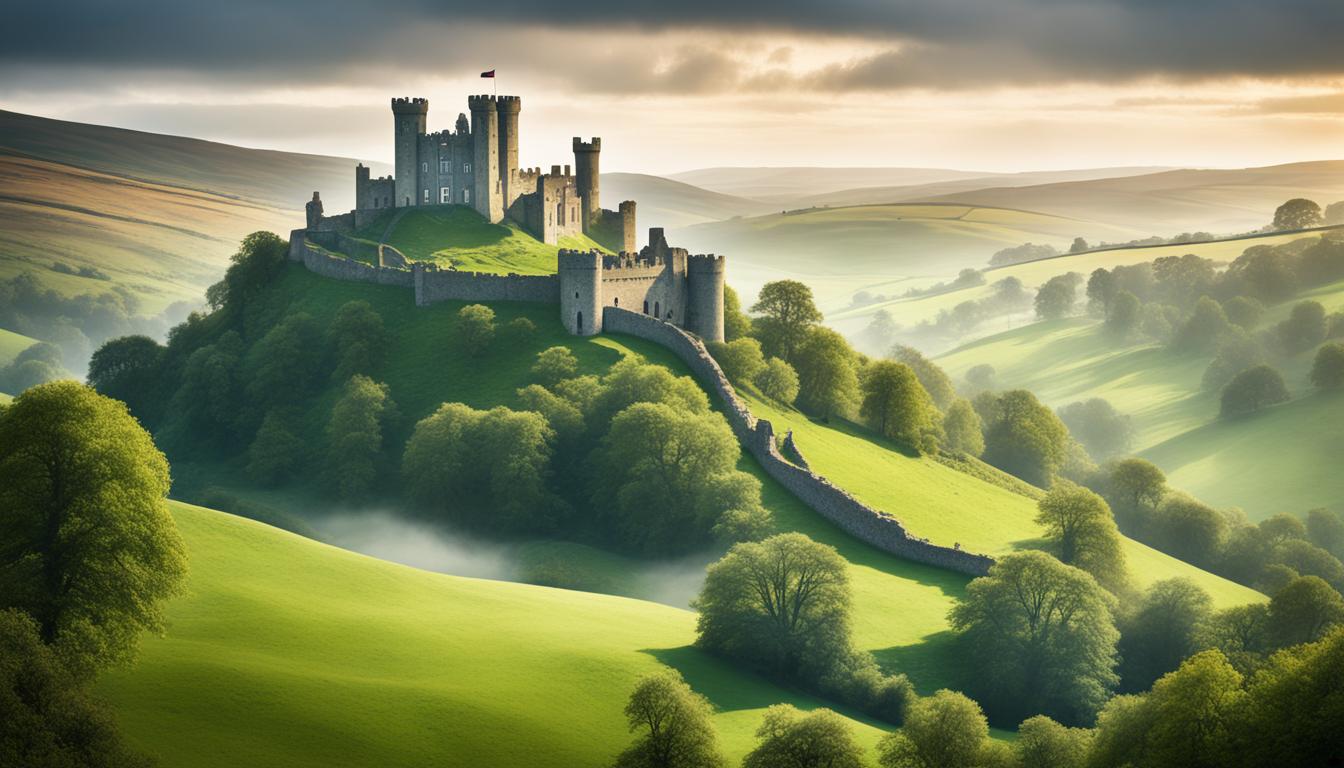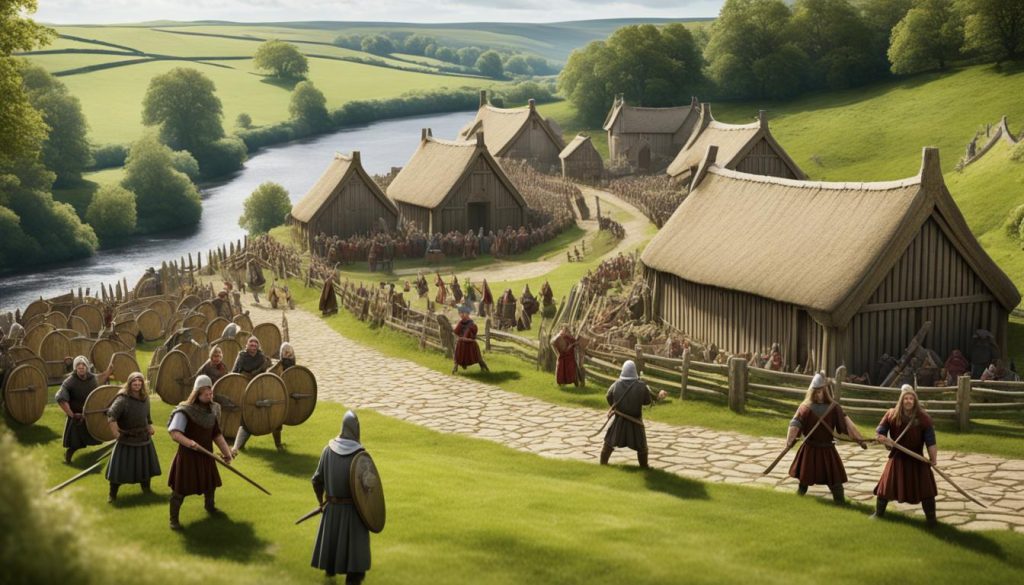The Captivating History of UK: Unraveling Its Rich Legacy

Embark on an enthralling journey through the centuries as we uncover the monumental events, iconic figures, and cultural tapestry that have shaped the United Kingdom’s identity. From the ancient settlements and prehistoric civilizations that dotted the British Isles to the rise and fall of the mighty British Empire, this article will explore the rich legacy that has made the UK the storied nation it is today. Prepare to be captivated by the captivating HISTORY OF UK.
Key Takeaways
- Uncover the captivating journey through the HISTORY OF UK, from ancient settlements to the modern era.
- Explore the pivotal events, influential figures, and cultural legacies that have forged the British identity.
- Discover the rise and fall of the mighty British Empire and its global impact.
- Delve into the rich tapestry of English heritage and the evolution of British culture.
- Understand the significance of key moments in the UK timeline, such as the English Civil War and the Industrial Revolution.
Origins of the British Isles
The HISTORY OF UK can be traced back to the ancient settlements and prehistoric civilizations that thrived on the British Isles long before the arrival of recorded history. Archaeologists have uncovered a wealth of evidence, including the iconic Stonehenge monument and the remnants of Celtic tribes, that shed light on the region’s distant past.
Ancient Settlements and Prehistoric Civilizations
The British Isles have been home to human habitation for thousands of years. Excavations have revealed the existence of ancient settlements, such as the Skara Brae in Orkney, Scotland, which date back to the Neolithic period. These sites provide valuable insights into the lives and customs of the people who inhabited the region during prehistoric times.
The Arrival of the Celts
One of the most significant developments in the HISTORY OF UK was the arrival of the Celts, a collection of tribes with a shared cultural and linguistic heritage. The Celts settled across the British Isles, leaving a lasting impact on the region’s English heritage and British history. Their influence can be seen in various aspects of the region’s cultural and architectural traditions.
Roman Conquest and Legacy
The HISTORY OF UK underwent a pivotal transformation in the 1st century AD, as the Roman Empire extended its reach across the British Isles. This monumental event marked a significant turning point, ushering in a new era of cultural, architectural, and technological advancements that would forever shape the identity of the region.
Expansion of the Roman Empire
As the Roman Empire expanded, it brought with it a host of innovations that would leave an indelible mark on British HISTORY and heritage. The construction of intricate road networks, bustling cities, and the iconic Hadrian’s Wall stand as enduring reminders of the Roman influence on the British landscape. This period witnessed the introduction of advanced agricultural techniques, sophisticated legal systems, and new religious practices that would become integral to the development of British culture.
Influence on British Culture and Architecture
The Roman occupation had a profound impact on the artistic and architectural traditions of the British Isles. The iconic Roman-style buildings, such as the baths and villas found throughout the region, showcase the sophisticated engineering and design sensibilities that the Romans brought to the HISTORY OF UK. Additionally, the Romans’ mastery of engineering and construction techniques paved the way for the development of some of Britain’s most impressive architectural marvels, which continue to captivate visitors and scholars alike.
The Anglo-Saxon Era
Following the withdrawal of Roman forces from Britain, the islands were subject to a series of invasions from Germanic tribes, including the Angles, Saxons, and Jutes. These new settlers, collectively known as the Anglo-Saxons, gradually established a network of kingdoms that would eventually coalesce into the foundations of the modern United Kingdom. The Anglo-Saxon period saw the emergence of distinct regional identities, the development of early English language and literature, and the rise of Christianity as a dominant religious force in the British Isles.
Invasions from Germanic Tribes
As the Roman Empire’s grip on Britain weakened, the islands were left vulnerable to a series of invasions by various Germanic tribes, including the Angles, Saxons, and Jutes. These groups, collectively known as the Anglo-Saxons, began to establish a foothold in British history, gradually claiming territory and forming their own distinct kingdoms.
The Rise of Anglo-Saxon Kingdoms
Over time, the Anglo-Saxon settlers consolidated their power, establishing a network of regional kingdoms that would lay the foundations for the eventual formation of the United Kingdom. This period saw the emergence of cultural and linguistic diversity, as the various Anglo-Saxon tribes developed their own unique identities and dialects, contributing to the rich tapestry of English heritage.

HISTORY OF UK: Exploring the Medieval Period
The medieval period in the HISTORY OF UK was a time of significant political and social upheaval, as well as the solidification of the monarchy’s power. This captivating era witnessed the Norman Conquest of 1066, led by the formidable William the Conqueror, which ushered in a new chapter of rule and the creation of the Domesday Book – a comprehensive survey of land ownership in England. Additionally, this period saw the signing of the Magna Carta in 1215, a landmark document that would ultimately limit the power of the monarch and lay the foundations for the development of parliamentary democracy in the UK.
The Norman Conquest and the Domesday Book
The Norman Conquest of 1066 was a pivotal moment in the HISTORY OF UK, as it marked the end of Anglo-Saxon rule and the beginning of a new era under the leadership of William the Conqueror. The Normans brought with them a range of administrative, military, and cultural innovations that would shape the trajectory of the British Isles for centuries to come. One of the most significant legacies of the Norman Conquest was the Domesday Book, a meticulous record of land ownership and resources that served as a foundation for the kingdom’s taxation and governance systems.
The Magna Carta and the Birth of Parliament
The year 1215 marked a pivotal moment in the HISTORY OF UK with the signing of the Magna Carta, a landmark document that would forever alter the balance of power between the monarchy and its subjects. This charter, signed by King John, placed limits on the sovereign’s authority and laid the groundwork for the development of parliamentary democracy in the UK. The Magna Carta enshrined the principles of due process, the right to a fair trial, and the concept of habeas corpus, which would become cornerstones of the British legal system. The birth of Parliament, as a representative body that could check the power of the crown, was a direct result of the Magna Carta’s enduring legacy.
The Tudors and the English Reformation
The HISTORY OF UK was profoundly shaped by the Tudor dynasty, which ruled England from the 15th to the 17th century. This era was marked by dramatic events and influential figures, none more so than the reign of Henry VIII. As the monarch broke away from the Catholic Church and established the Church of England, a religious and political upheaval unfolded that would have lasting consequences for the British Isles.
The Reign of Henry VIII
Henry VIII’s reign, which spanned from 1509 to 1547, is a pivotal chapter in the HISTORY OF UK. Known for his marriages, complex relationships, and absolute authority, the Tudor king’s decision to sever ties with the Catholic Church and create the Church of England drastically transformed the cultural and religious landscape of the British Isles. This momentous shift not only challenged the traditional power structures but also paved the way for the English Reformation, a seismic event that would have far-reaching implications for the UK’s HISTORY, British culture, and UK monarchs for generations to come.
The Establishment of the Church of England
The establishment of the Church of England, spearheaded by Henry VIII, marked a significant turning point in the HISTORY OF UK. Motivated by a desire to annul his marriage to Catherine of Aragon and secure a male heir, the king’s break from the Catholic Church allowed him to consolidate his power and assert his authority over religious matters. This dramatic shift in the UK’s religious landscape had a profound impact on the English heritage, as the newly formed Church of England became the dominant religious institution, shaping the cultural and social fabric of the British Isles for centuries to come.
The Stuarts and the English Civil War
The HISTORY OF UK took an intriguing turn with the ascension of the Stuart dynasty, which succeeded the Tudor monarchs. This period was marked by an ongoing power struggle between the monarchy and Parliament, as the new rulers sought to assert their authority in the face of growing demands for greater political representation and religious reform.
Conflicts between the Monarchy and Parliament
The tensions between the Stuart monarchs, particularly King Charles I, and the Parliamentarians came to a head in the English Civil War. This conflict, which pitted Royalists against Parliamentarians, was a pivotal moment in the HISTORY OF UK, as it challenged the traditional balance of power and ushered in a new era of constitutional change.
The execution of King Charles I in 1649 by the Parliamentarians was a shocking and unprecedented event, demonstrating the Parliament’s determination to assert its supremacy over the monarchy. This dramatic outcome laid the groundwork for the UK’s transition towards a constitutional monarchy, where the power of the crown would be increasingly limited by the will of the people’s representatives.
The aftermath of the English Civil War had far-reaching implications for the HISTORY OF UK, as it solidified the role of Parliament in the country’s governance and set the stage for the Glorious Revolution of 1688, which further cemented the supremacy of the legislative branch over the monarch.

The Age of Exploration and the British Empire
The HISTORY OF UK is closely intertwined with the nation’s involvement in global exploration and the establishment of the British Empire. Voyages of discovery, such as those undertaken by Sir Francis Drake and James Cook, allowed the UK to expand its reach and establish colonies around the world. This, in turn, led to the rise of the British Empire, a global superpower that at its height spanned continents and shaped the course of world history.
Voyages of Discovery and Colonization
During the Age of Exploration, the United Kingdom’s seafarers embarked on ambitious journeys to uncharted territories, driven by a thirst for adventure, trade, and the pursuit of imperial ambitions. Captains like Sir Francis Drake and James Cook played pivotal roles in these voyages, mapping new routes, establishing trade agreements, and laying the foundation for the growth of the BRITISH EMPIRE.
The Rise of the BRITISH EMPIRE
The successful expeditions of British explorers and the establishment of colonies across the globe allowed the UK to amass immense power and influence. The BRITISH EMPIRE, which at its peak spanned territories on every continent, became a global superpower that shaped the course of world HISTORY OF UK. From the Americas to Asia, the UK’s colonial reach expanded, fueling economic prosperity, technological advancements, and cultural exchange, while also raising complex questions about the nature of imperialism and its lasting impacts.
The Industrial Revolution
The HISTORY OF UK was profoundly shaped by the momentous Industrial Revolution that swept across the nation in the late 18th and early 19th centuries. This transformative period witnessed a surge of innovations and technological advancements that propelled the UK to the forefront of the global economy, solidifying its status as the world’s leading industrial power.
Innovations and Technological Advancements
The Industrial Revolution in the HISTORY OF UK was marked by a series of groundbreaking innovations that revolutionized key industries. The invention of the steam engine, pioneered by figures like James Watt, ushered in a new era of mechanized production, transforming transportation, manufacturing, and mining. Advancements in textile machinery, such as the spinning jenny and the power loom, enabled mass production and significantly increased the efficiency of British textile mills. Additionally, the development of iron and steel manufacturing, as well as the expansion of the railway network, further fueled the rapid industrialization of the UK.
Social and Economic Transformations
The Industrial Revolution in HISTORY OF UK not only reshaped the nation’s economic landscape but also brought about profound social changes. The influx of workers to urban centers, drawn by the promise of employment in the new factories and mills, led to the rapid growth of cities and the emergence of a sizable urban working class. This shift in the demographic landscape presented new challenges, as the country grappled with issues of overcrowding, poor living conditions, and the exploitation of workers, particularly women and children. The tensions between the growing industrial bourgeoisie and the working class would eventually culminate in social movements and political reforms aimed at improving the lives of the urban poor.
The HISTORY OF UK’s Industrial Revolution stands as a pivotal moment, transforming the nation from an agrarian economy to an industrial powerhouse. This unprecedented era of technological innovation and economic growth also catalyzed significant social and cultural transformations that would continue to reverberate throughout the British Isles and beyond.
World Wars and the Modern Era
The 20th century saw the HISTORY OF UK deeply intertwined with the nation’s involvement in two world wars, events that had a profound impact on the country’s history and global standing. As Britain played a crucial role in the Allied victories of World War I and World War II, the immense human and economic toll of these conflicts also contributed to the gradual decline of the British Empire.
Britain’s Role in World War I and World War II
During the tumultuous years of the early 20th century, the HISTORY OF UK was marked by the nation’s pivotal involvement in the two global conflicts that would come to define the era. As a leading member of the Allied forces, Britain’s contributions on the battlefield and in the war efforts were instrumental in securing victory against the Axis powers. From the trenches of the Western Front to the skies over the Battle of Britain, the British military and civilian population displayed unwavering courage and resilience in the face of adversity.
The Decline of the British Empire
However, the tremendous sacrifices and staggering losses suffered by the UK during these world wars also played a significant role in the gradual decline of the British Empire. The financial and human toll of the conflicts, combined with the shifting geopolitical landscape of the postwar era, eroded Britain’s global dominance and hegemony. As the 20th century progressed, the UK found itself navigating a complex and rapidly evolving UK timeline, facing the challenge of redefining its place in the world and adapting to the new realities of the modern era.
Conclusion
The HISTORY OF UK is a rich tapestry woven with countless threads of triumph, struggle, and transformation. From the ancient settlements of the British Isles to the rise and fall of the British Empire, this captivating narrative has left an indelible mark on the world. By exploring the key events, influential figures, and cultural legacies that have shaped the United Kingdom over the centuries, we gain a deeper understanding of the forces that have forged this nation’s identity.
As we look towards the future, the HISTORY OF UK serves as a testament to the resilience, determination, and innovation that have characterized the British people, inspiring us to continue the legacy of this remarkable island nation. The UK timeline has been a tapestry of progress, challenges, and triumphs, weaving a story that continues to captivate and inspire people across the globe.
The HISTORY OF UK is a rich and complex narrative that has profoundly shaped the world we live in today. By understanding and appreciating the pivotal moments, influential figures, and cultural legacies that have defined the United Kingdom, we can better navigate the challenges and opportunities that lie ahead, ensuring that the British history continues to evolve and thrive in the years to come.

Visitor comments ( 0 )